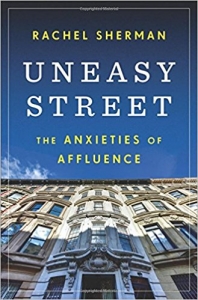In Uneasy Street: The Anxieties of Affluence, Rachel Sherman undertakes 50 in-depth interviews with rich New Yorkers to consider how they navigate their anxieties and the negative connotations surrounding extreme wealth. The frank accounts offered in the book provide a complex picture of elite consumption and the attempt to reconcile affluence and moral legitimacy, finds Jonathan Yong Tienxhi.
Uneasy Street: The Anxieties of Affluence. Rachel Sherman. Princeton University Press. 2017.
 Find this book (affiliate link):
Find this book (affiliate link): ![]()
We live in an era which has every appearance of being increasingly obsequious towards the extremely wealthy: Donald Trump crassly boasted of his status as a ‘really rich’ man in the run-up to the 2016 US Presidential election, while Oprah Winfrey’s recent proclamation that she is ruling out a presidential run has not deterred political pundits and media outlets from fantasising about the prospect of a campaign between two celebrity plutocrats in 2020. In this political climate, it is refreshing to read Rachel Sherman’s Uneasy Street: The Anxieties of Affluence, which purports to consider a sociological phenomenon that is as easy to mock as to overlook – the stigma attached to great wealth.
Sherman is a professor of sociology at The New School of Social Research, with over a decade’s worth of experience in using ethnographies and qualitative interviews to uncover how class inequalities are justified and entrenched in contemporary capitalism. Her latest work utilises 50 in-depth interviews with affluent New Yorkers to consider how the wealthy interpret and understand their own consumption patterns. Sherman’s subject matter invites comparison with Thorstein Veblen’s landmark study of affluent consumerism, The Theory of the Leisure Class: An Economic Study of Institutions. Yet Uneasy Street differs from Veblen’s treatise in both form and substance: Sherman is as empathetic as Veblen was sardonic, and she eschews broad socio-economic analysis for a more intimate examination of New York’s privileged elite. At the core of her argument is the proposition that the wealthy do not simply use consumption to publicly display economic power and solidify social status (contrary to Veblen). Rather, she explores how the affluent seek to avoid the stigma associated with exorbitant wealth by emphasising the modesty of their spending, using money for social purposes and raising children in a non-materialistic fashion.
Much of the allure of Uneasy Street lies in its author’s ability to convince her interviewees to give frank accounts of their lifestyles, a conversation which one respondent describes as akin to talking about masturbating. This offers glimpses into the social lives of the wealthy, which few outside the elite have witnessed, through a range of memorable anecdotes. One interviewee points out that he pays ‘a shitload of federal income tax’ when asked about charitable giving (146); another person recounted her son’s words after flying on a commercial airline: ‘It was great, but next time we fly private like everyone else’ (210). Yet, Sherman urges us to refrain from our inclination to be judgmental, instead offering an account in which members of the affluent class generally desire to act morally and are to some degree aware of their own advantages. Many of her interviewees perceive themselves as having acquired wealth through luck (64), and others offer detailed critiques of how their own lifestyles serve to perpetuate poverty (52). This allows Sherman to paint a more complex picture of elite consumption than typically portrayed in popular media.
Uneasy Street is an insightful guide through the struggle faced by elites in reconciling extreme wealth with the desire for moral legitimacy. Sherman writes with great nuance and subtlety, skilfully navigating social taboos in her interviews while providing thoughtful reflections on the research process. This includes the challenge of deconstructing the logic of moral judgment while being subject to the same ideological pressures as well as practicalities, such as her need to upgrade her wardrobe in preparation for the interviews. Reading Uneasy Street provoked me to re-evaluate my own mechanisms for coping with the tensions Sherman describes: I recall complaining about the difficulties of living on a scholarship stipend while among certain social circles at the LSE, in order to deliberately draw boundaries between myself and the stereotype of the rich, ethnically Chinese international student who did not face such financial restrictions – a manoeuvre that Sherman would undoubtedly identify as a means of deflecting from my own class privilege.
Yet, it is difficult to escape the conclusion that the broad arguments made in Uneasy Street espouse rather than debunk conventional wisdom. After all, evidence that the wealthy try to interpret their spending behaviour as morally worthy is prevalent across the political landscape, from countless articles in business websites celebrating the frugality of certain members of the billionaire class, to the swaggering anonymous email that went viral around Wall Street trading desks for describing the intensity of trading workdays: “We don’t demand a union. We don’t retire at 50 with a pension. We eat what we kill.’ Uneasy Street is unusual in choosing to focus on respondents who are less emblematic of the greedy millionaire cliché – Sherman’s interviewees are culturally curious, mostly women and generally politically liberal. Sherman is too attentive not to anticipate the objection that this sample group is unrepresentative of the affluent classes, yet her response that most privileged people still want to feel morally worthy (254) feels unsatisfactory. The need for moral validation in consumption is not limited to any social class, and Sherman does not articulate why her respondents interpret legitimate consumption so differently from the plutocrats described in Robert Frank’s Richistan, for instance.
The preponderance of women in Sherman’s interview samples is surely a significant part of this explanation, and indeed Uneasy Street is particularly insightful when exploring the gender dynamics within affluent households. Sherman provides sympathetic and detailed depictions of how women are unevenly yoked in the quest to attain morally worthy spending power. The stay-at-home mothers interviewed struggle to establish their consumption as legitimate due to the absence of financially rewarding labour in their lives, while their husbands are able to authorise or reject certain expenditures due to their position as the source of monetary income. Sherman is astute enough to point out that this remains the case even in situations where the husband is outwardly supportive, as he retains the prerogative to withdraw this when convenient. Thus, Uneasy Street presents a useful exploration of the intersection between class privilege and the sociology of gender, highlighting the unequal relations of distribution in affluent families even as they live vastly privileged lives compared to the rest of the population.
Sherman contends that the attraction of the affluent towards morally legitimate consumption has a clear political implication. Rather than drawing distinctions between members of the affluent class who are ‘moral’ or ‘immoral’ based on their spending patterns, capacity for charity or self-awareness of privilege, we should focus on dismantling systems of distribution that reproduce such wealth disparities. Sherman is surely correct to assess that exorbitant wealth inequality is immoral regardless of how such individuals seek to legitimise their expenditure, whether these are Trump’s vulgar pretensions or the gentler, sophisticated rationalisations found in Uneasy Street. However, severing the link between moral judgement and wealth inequality could potentially obscure the fact that the latter tends to exacerbate the demise of the former. Not only is there a growing body of academic research which indicates that there is an association between higher social class and unethical decision-making, but it is also intuitively true that increasing a person’s affluence would reduce their capacity for reasonable consumption patterns and tendencies towards critiquing unjust economic systems. Or, as one of Sherman’s interviewees puts it: ‘I used to say I was gonna be a revolutionary, and then I had that first massage’ (115).
Note: This review gives the views of the author, and not the position of the LSE Review of Books blog, or of the London School of Economics. The LSE RB blog may receive a small commission if you choose to make a purchase through the above Amazon affiliate link. This is entirely independent of the coverage of the book on LSE Review of Books.
Image Credit: (Pixabay CC0).









2 Comments